Trifonov and Grimaud are among the debuts, old friends make welcome returns, and Limelight can reveal the Tristan cast.

Principal Conductor Asher Fisch has launched the West Australian Symphony Orchestra’s 2017 season by announcing a two-year voyage of discovery focussing on his beloved Richard Wagner. A two-concert festival next year will explore the idea of Wagner and Beyond, while the teaser is the revelation of a pair of concert performances in 2018 – WASO’s 90th anniversary year – of the master’s seminal work, Tristan und Isolde. A whopping 22 artist debuts, including pianists Daniil Trifonov and Hélène Grimaud, plus four world premieres, are among the other top draws.
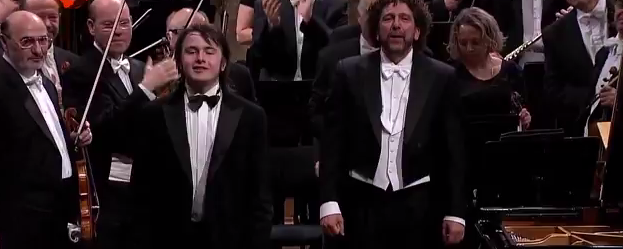 Asher Fisch conducts a young Daniil Trifonov at the Rubinstein Competition
Asher Fisch conducts a young Daniil Trifonov at the Rubinstein Competition
Making the pilgrimage to Perth to catch up with Maestro Fisch ahead of the cat being officially released from the bag, I begin by asking about his 2016 highlights. “Mahler Two, for sure” is the immediate reply. “We started with Mahler Nine, and then we did One, and then we did Two, and you can see when a language is becoming apparent to an orchestra, that’s a big joy.” Fisch’s memorable moments would include the St John Passion, a challenge for an Israeli Jew that he says he “needed” to take (and a work he says he’ll probably not conduct again), and another highlight that is still to come – the orchestra’s imminent tour to China. “It’s exciting because now we’re going with Mahler Five and not the Shostakovich symphony, which makes me very happy,” he beams across the table.
It’s four years since Fisch took up the WASO baton, and those who have been on the journey with him will doubtless be delighted to follow the next turn in the road as he prepares to tackle more cornerstones of the German Romantic repertoire. The Wagner first, and a composer whose music was “a life-changing experience” for Fisch in 1992 when he left Israel to work in Berlin with Daniel Barenboim. “How could I have become a musician without having Wagner in my repertoire?” says Fisch of his Road to Damascus moment. “I realised that’s where my heart was musically, no question. And it can really make a difference with an orchestra if you deal with Wagner.”
The real highlight of the orchestra’s Wagner odyssey is in the small print – those two concert performances of Tristan in 2018 – and Fisch is happy to spill the beans on casting (see the end of this article). Those performances were originally planned for 2017, but exigencies of international opera schedules have a habit of getting in the way, hence a preparatory Wagner week next year as a way of educating the unbelievers and leading the acolytes on towards the Holy Grail (to well and truly mix my Wagner opera metaphors). “Wagner revolutionised every parameter of music – rhythm, form, instrumentation, opera text, libretto, harmony, everything – polymeter occurs for the first time in Siegfried, Fisch declares. “So the idea was let’s see where he was coming from.”
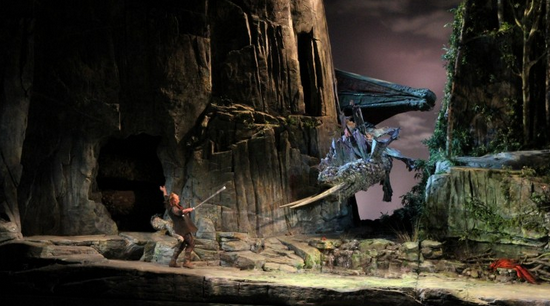 Seattle Opera’s Siegfried – a cycle that Fisch has conducted many times
Seattle Opera’s Siegfried – a cycle that Fisch has conducted many times
The Wagner and Beyond concerts, then, will set out with the music from around the 1830s and 40s that Wagner would have known. “If Wagner had gone to the Dresden Opera he would have heard Marschner, and maybe bits of Schumann, or Tsar and Zimmermann by Lortzing,” Fisch explains. “I did once go to hear Marschner’s Der Vampyr, and I was shocked at how close to The Flying Dutchman it was. So I thought ‘Bingo!’ This is a good overture, it’s all diminished chords.”
The after effects of Wagner have a few surprises too, like the overture to Chabrier’s Gwendoline. “It was really important for me to show the French connection,” says Fisch. “All French composers were complete Wagnerites. It wasn’t until Debussy and Ravel found there own way they made something like French impressionism – but even then, impressionism for me starts with Siegfried’s Forest Murmurs.”
Wager’s best known followers would generally be reckoned as Gustav Mahler and Richard Strauss, both composers through whose output Fisch has been working his way in recent years. His Mahler cycle will continue next year with the massive Sixth Symphony, a work that frightens Fisch far less, he says, than the Seventh – a work he admits he still doesn’t get. “The Sixth needs stamina and big resources but, along with the Ninth, I think the Sixth is Mahler’s only purely orchestral work,” he reasons. “I hear Mahler the conductor in this work – you can hear the upbeats going through his mind. His struggle with the order of the movements, that structure and the huge climaxes at the end, that’s the challenge and the joy. But for me it’s the conductor’s symphony, rather than the poet’s or the singer’s.”
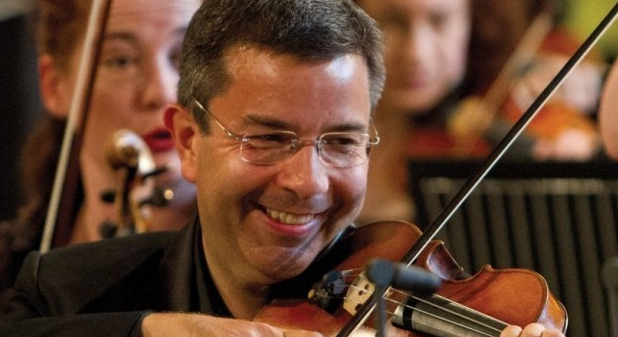 WASO Concertmaster Laurence Jackson
WASO Concertmaster Laurence Jackson
Strauss’s Ein Heldenleben will also feature in 2017, a work that Fisch says he’d put off until he had found the right concertmaster – in this case WASO’s Laurence Jackson. “It’s really a violin concerto,” Fisch explains. “We’ve done enough Strauss by now that the language is known – the orchestra knows what to expect, the horns are great – I don’t think it will pose a problem.” Laurence Jackson will also feature as soloist in Stravinsky’s Violin Concerto, but other WASO Principals will also be basking in the limelight including Principal Trombone Joshua Davis who will play a new concerto by Paul Stanhope.
Other repertoire to feature in the Principal Conductor’s nine programmes will be Schumann’s Symphony No 4 and Schubert’s Great C Major – core Fisch territory. He’ll also direct some rare Brahms choral works with orchestra – the beautiful Schicksalslied and the idiosyncratic Gesang der Parzen – as well as the (deferred by the Chinese) Shostakovich Symphony No 10 and – a new direction this – Sibelius’s Symphony No 2.
“The very, very early works of Sibelius are Wagnerian,” Fisch reckons, placing the Finnish maverick clearly in the line of the German Romantics, and he goes on to talk about an interview he’d heard with the late Lorin Maazel, in which he explained how he’d not dealt with Sibelius until late in his career but had then gone on to record two complete cycles of the symphonies. “So there must me something in it,” Fisch laughs. “I want to have another Wagner experience with Sibelius, so let’s see if I can have the same one as Lorin Maazel.”
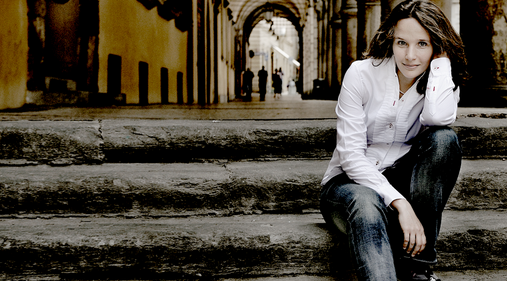 Pianist Hélène Grimaud
Pianist Hélène Grimaud
Among the top-flight artists making their WASO debut in 2017 will be piano superstars Daniil Trifonov and Hélène Grimaud, Berlin Philharmonic Principal Horn Stefan Dohr, guitarist Karin Schaupp and violinist Yu-Chen Tseng. Fisch knows Trifonov’s work well. “I was lucky enough to conduct his finals in the Rubinstein Competition,” he explains. “He played Chopin’s First Concerto and it was incredible. There’s a consensus in the world right now that he is the hot new ticket. He’s a remarkable artist, remarkable. He’s the new Kissin – he’s on that level – but more poetic and deeper.”
Plenty of old friends will be returning as well: Pinchas Zukerman, playing Berg’s extraordinary Violin Concerto subtitled ‘to the Memory of an Angel’, Canadian pianist Louis Lortie in Chopin’s First Concerto, Jayson Gillham playing Schumann and cellist Li-Wei Qin playing Saint-Saëns. Zukerman is one of Asher Fisch’s most valued colleagues, and he’s clearly delighted to have him back. “I’ve done the Berg before with him but it’s been many years since he’s played it,” says Fisch. “He wants to bring it back, and that’s a great joy for us.” Initially Zukerman was coming with his trio just to do the Beethoven Triple, until Fisch and his programming guru Evan Kennea came up with a cunning plan. “We thought, let’s risk it and ask him to play the Berg as well,” Fisch recalls, admitting that they thought that he would say no. “His manager said, ‘if it’s with Asher – it will be a joy’,” adds Kennea.
Not just soloists, but conductors as well will be Perth bound, with concerts led by Martyn Brabbins, Douglas Boyd, Christopher Dragon and Daniel Blendulf. And in a pair of special events, WASO will celebrate 30 years of performing with Vladimir Verbitsky (he conducts Tchaikovsky’s Manfred Symphony and Rachmaninov’s underrated choral work The Bells) plus 20 years with Simone Young who returns to lead the orchestra in an evening of Haydn and Brahms.
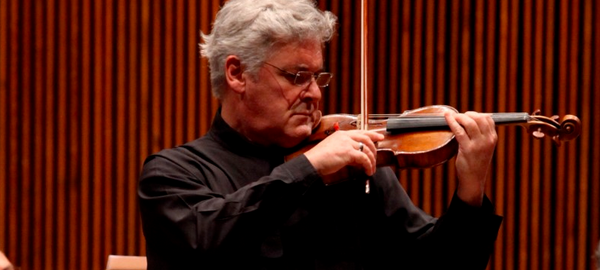 Pinchas Zukerman
Pinchas Zukerman
Among the broader appeal events in the coming year will be an evening with singer, songwriter and composer of new opera The Rabbits, Kate Miller-Heidke, a concert with jazz-balladeer-cum-indie pop artist Megan Washington, and the latest tour of popular Australian vocal quartet The Idea of North. Film fans can look forward to more in the orchestra’s hugely successful series of live scores with Harry Potter and the Philosopher’s Stone and a programme of highlights from John Williams’ most memorable film scores.
Other innovations will include four world premiere performances, including two works written by Lachlan Skipworth, WASO’s latest Composer in Residence, and for the first time, the WASO Chorus will present a pair of matinee concerts of choral masterpieces amidst the grandeur of St Mary’s Cathedral.
Last but not least, that teaser in the 2017 brochure small print. Who will be the singers headlining those 2018 performances of Tristan and Isolde? In a genuine coup for Western Australia, WASO has persuaded Aussie Heldentenor Stuart Skelton and Dutch soprano Eva Maria Westbroek to reprise the roles they sang at this year’s Baden Baden Festival with the Berlin Philharmonic and Sir Simon Rattle.
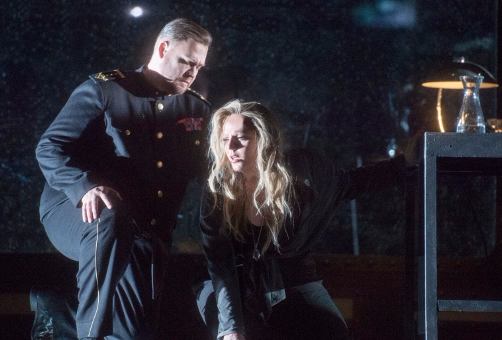 Stuart Skelton (Tristan) and Eva-Maria Westbroek (Isolde) © Monika Rittershaus
Stuart Skelton (Tristan) and Eva-Maria Westbroek (Isolde) © Monika Rittershaus
“We have one of the best Isoldes in the world, and I always thought Stuart would be a great Tristan,” says Fisch. “Eva Wagner told me that this year she went to Baden Baden and she said that in all her years of Wagner, this was one of the best Tristans she’s ever encountered,” he explains. “She was so moved she decided to stay an extra day and hear it again – and I trust Eva Wagner. So we are very, very happy to have the Baden Baden cast.”
With ambitious recording plans for the future, and a new CD set of last year’s Brahms symphonies about to be released on ABC Classics, the year ahead looks to be chock full of interest for WASO audiences, and those of us who listen in to them on the radio.
WASO’s 2017 Subscription Season is on sale now. Single Tickets are on sale from November 23. Phone WASO on 9326 0000 or visit waso.com.au











Comments
Log in to join the conversation.